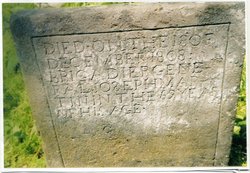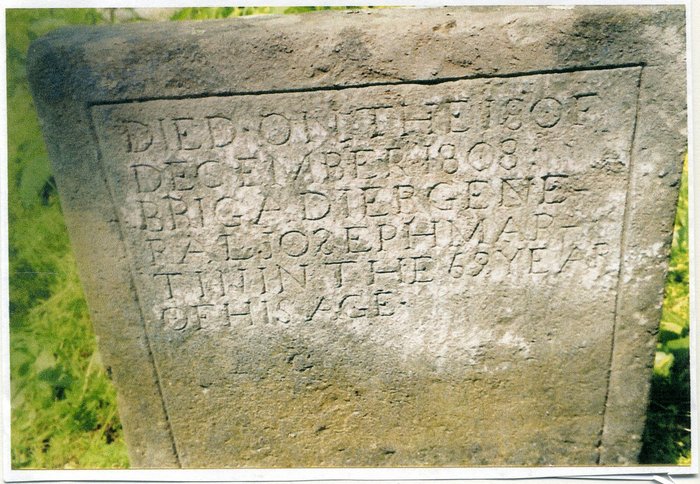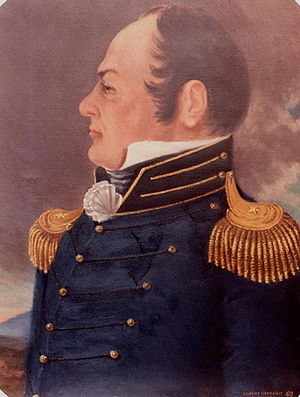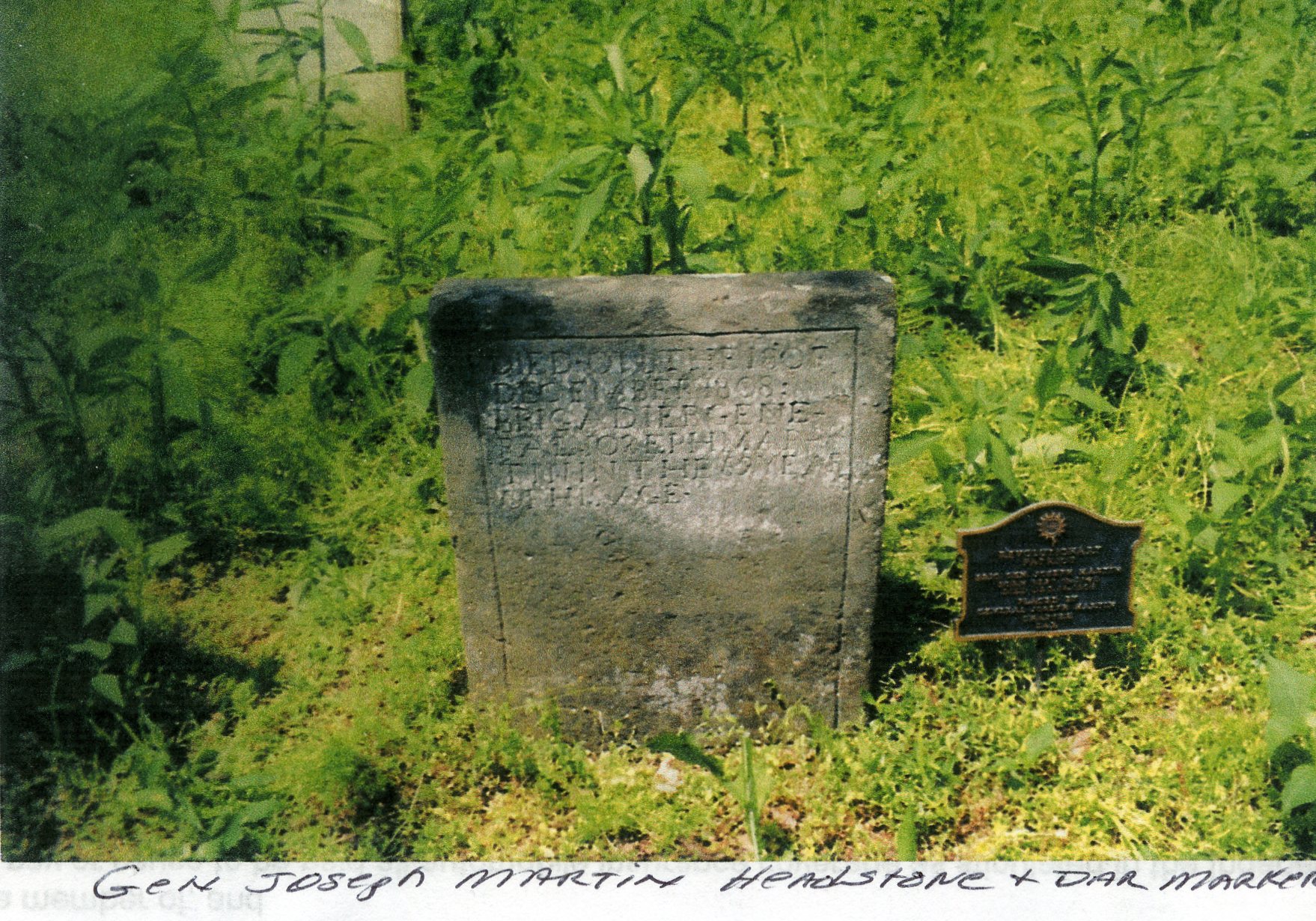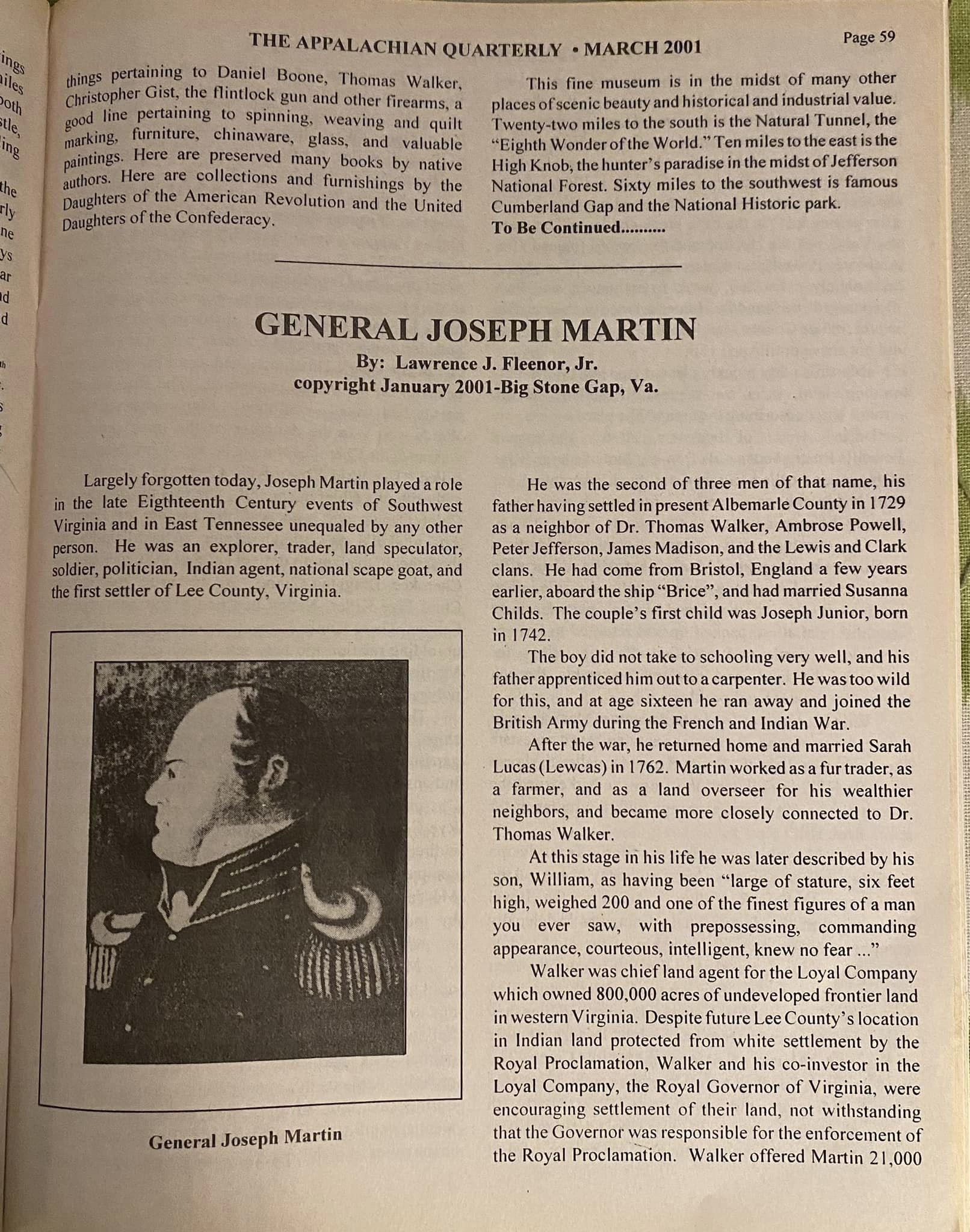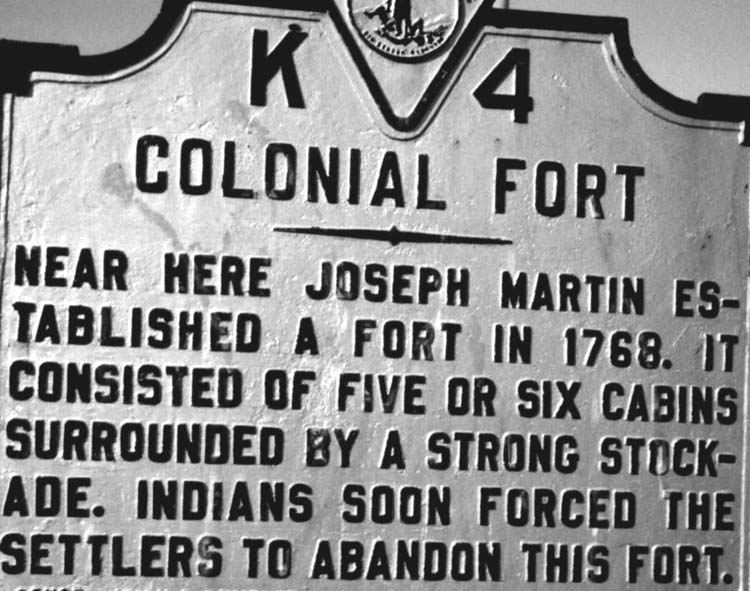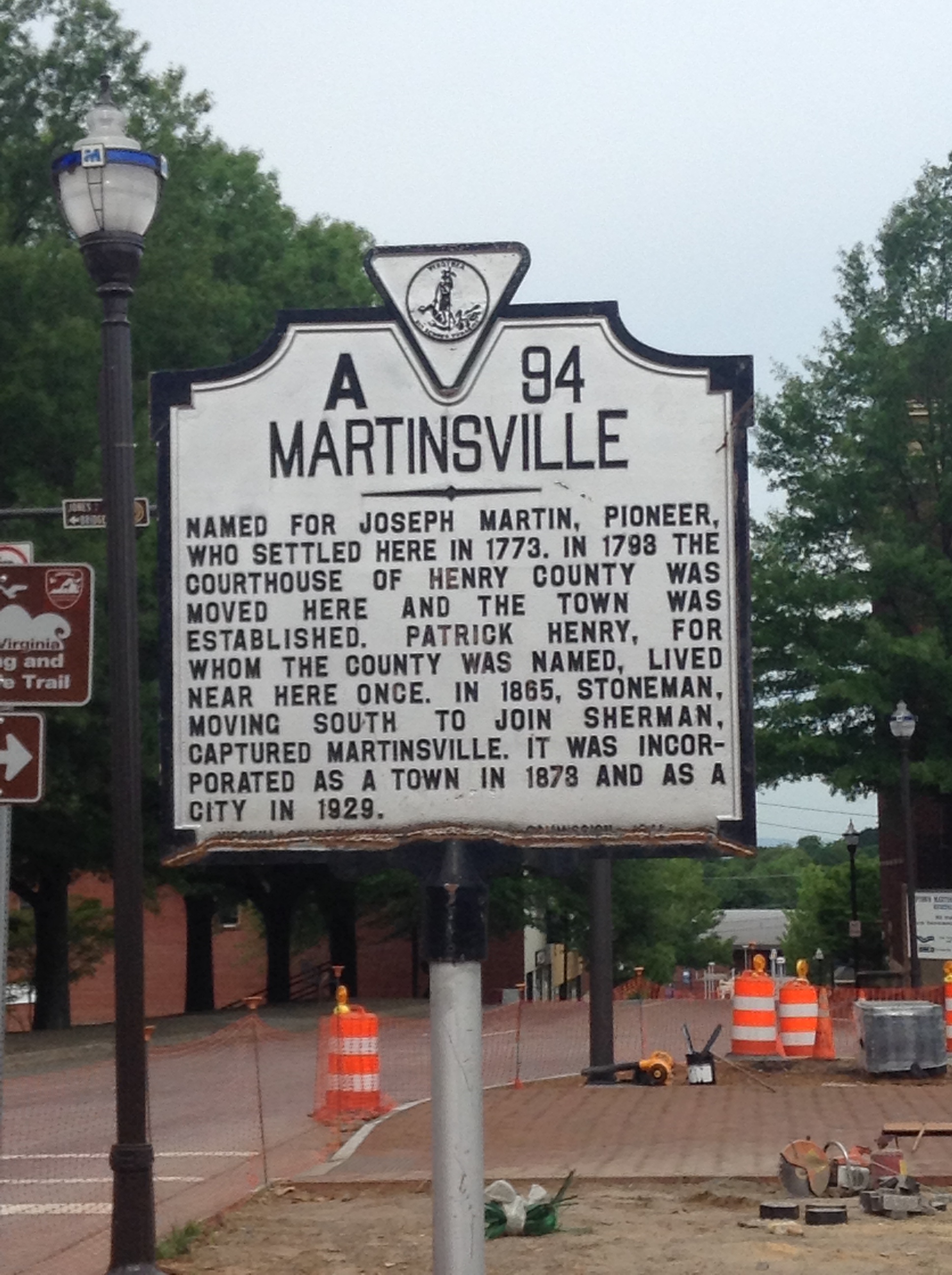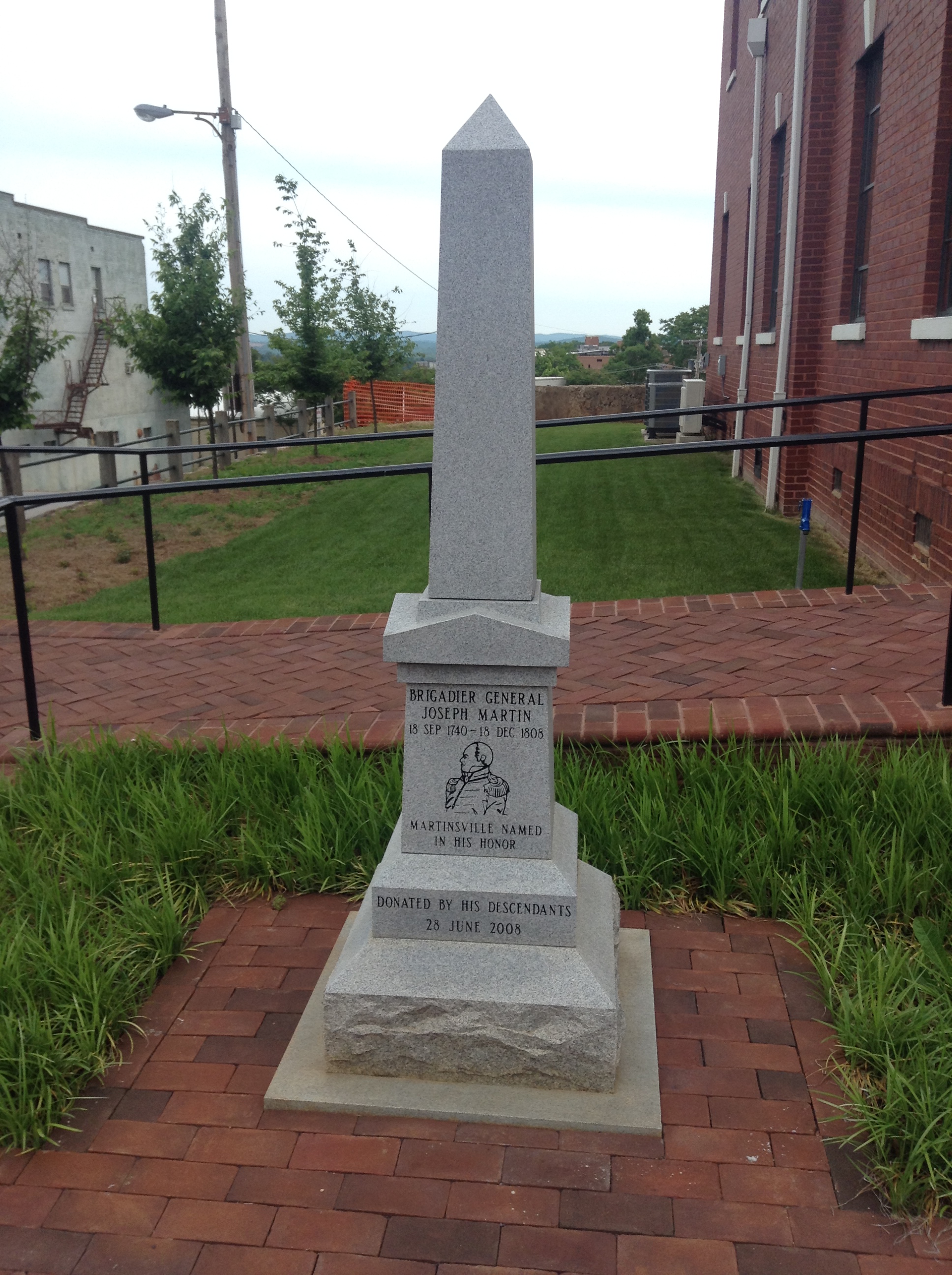His father came to Virginia and settled in Caroline County, where he met and married Susanna Chiles.
Joseph and Susanna moved to Albermarle County, VA.
===
They had four sons:
* Brigadier General Joseph Martin 1740-1808
Captain William Martin 1742-1809
Colonel John Martin of "Rock House" in Rockingham County, N.C.
Captain Brice Martin
===
The city of Martinsville, VA. is named for General Joseph Martin.
===
Joseph Martin (1740-1808) was a Brigadier General in the Virginia Militia during the American Revolutionary War, in which Martins' frontier diplomacy with the Cherokee Indian Nation is credited with averting Indian attacks on the Scotch-Irish settlers who won the battles of Kings' Mountain and Cowpens, hastening the Continental Army victory. Martin was born in Albemarle County, Virginia, and later lived on his plantation "Scuffle Hill" near the Smith River in Henry County, Virginia, not far from the 10,000-acre Leatherwood plantation of his friend, Governor Patrick Henry, who appointed him Virginias' Agent to the Cherokee Nation in 1777.
Martin served in the legislatures of several Southern states, and was a longhunter, pioneer, Indian trader and real estate speculator who attempted one of the earliest settlements of what became the state of Tennessee.
===
Another of his sons, Patrick Henry Martin, Joseph Martin named after his friend and sometime neighbor, Governor Henry.
After helping adjudicate the western boundary line between North Carolina, Kentucky and Virginia as far as the Cumberland Mountains, General Martin retired to his Belle Mont plantation at Leatherwood, which he purchased in 1796 from Benjamin Harrison V of Berkeley Plantation.
General Joseph Martin died at his Leatherwood plantation in 1808, and was buried in the family cemetery there. Buried alongside him at the graveyard at Belmont are three other Joseph Martins: Colonel Joseph Martin, son of the general, and his son Joseph and grandson Joseph, who lived at Greenwood plantation.
===
Initially known as Henry Courthouse, the town of Martinsville, Virginia was later renamed in honor of this early soldier, planter, pioneer and real estate speculator.
For many years afterwards, General Martin remained an obscure figure, until Lyman Draper began collecting reminiscences about him, including those of Major John Redd, a prominent Henry County planter who served under Martin, and who also wrote about his early recollections of General Nathaniel Greene, George Rogers Clark, Daniel Boone, Col. Benjamin Cleveland, Dr. John Walker, and other early prominent Virginia figures.
===
Col. William Martin was a son of General Joseph Martin.
Joseph Martin had 18 children by his two wives and his Cherokee common law wife.
Martins' descendants include his eldest son Col. William Martin, Tennessee pioneer, and member of the South Carolina and Georgia legislatures.
===
Nancy Ward (mother of Elizabeth Ward, Josephs' 3rd wife)was born in the Cherokee town of Chota and was a member of the Wolf Clan. Her mother, whose actual name is not known, is often called Tame Doe and was a sister of Attakullakulla.[1] Her father was probably part Delaware, also known as the Lenape. Her first husband was the Cherokee man Kingfisher. Nanyehi and Kingfisher fought side by side at the Battle of Taliwa against the Creeks in 1755. When he was killed, she took up his rifle and led the Cherokee to victory. This was the action which, at the age of 18, gave her the title of Ghigau.
Nancy Ward and her husband Kingfisher had two children, Catherine and Fivekiller. Nancy then married Bryant Ward, a South Carolina colonist and Indian trader, and their child was Elizabeth Ward, the Cherokee wife of General Joseph Martin.
In the Revolutionary War, Ward warned the whites of an impending attack by Dragging Canoe, an act that has made her a Patriot for the Daughters of the American Revolution and the Society of the Sons of the American Revolution.
Nancy had the power to spare captives. In 1776, following a Cherokee attack on the Fort Watauga settlement on the Watauga River (at present day Elizabethton, Tennessee), she used that power to spare a Mrs. William (Lydia Russell) Bean, whom she took into her house and nursed back to health from injuries suffered in the battle.
Mrs. Bean taught Nanyehi her new loom weave technique, revolutionizing the Cherokee garments, which at the time were a combination of hides, handwoven vegetable fiber cloth, bought from traders. But this weaving revolution also changed the roles of women in the Cherokee society, as they took on the weaving and left men to do the planting, which had traditionally been a womans' job.
Mrs. Bean also rescued two of her dairy cows from the settlement, and brought them to Nanyehi. Nanyhi learned to raise the cattle and to eat dairy products, which would sustain the Cherokee when hunting was bad.
The combination of loom weaving and dairy farming helped transform Cherokee society from a communal agricultural society into a society very similar to that of their European-American neighbors, with family plots and the need for ever-more labor. Thus some Cherokee adopted the practice of chattel slavery. Nanyehi was among the first Cherokee to own African-American slaves.
===
A monument was errected in 2008 on the old Henry Courthouse square in Martinsville, VA.
It is not Gen. Joseph Martins' tombstone.... it is located at the Martin Cemetery, Leatherwood, Henry County, VA.
===
Gen. Joseph Martin was a colorful, self-willed man with a fine sense of honor. He joined the Virginia militia when he was sixteen years old; was a long hunter; gambler; Indian fighter; Colonial and
Revolutionary War officer; and a great diplomat.
He was the Brigadier General for both the Washington District of North Carolina and the Virginia Militia.
He spent a short time in Georgia on duty for North Carolina and was elected to the Georgia legislature.
He was also a Representative for Sullivian County in North Carolina legislature during the turbulent State of Franklin years and was undoubtedly the most influential person of his time to defeat the State of Franklin from becoming a permanent State.
In 1789 he sold his lands in Powell Valley (Ewing, Va.), and at Long Island (Kingsport, Tenn.) returning to his plantation located on Leatherwood Creek, near present day Martinsville, Va. (Henry County). Having spent thirteen years living in the Cherokee Wilderness lands as the peacemaker,Indian Agent and Revoluntary War General, the wilderness lost their most colorful resident, a man of remarkable abilities and great courage. In the summer of 1808 Gen. Martin made his last journey. The sixty-eight year old soldier made the long trek to the old frontier, passing through Long Island (Kingsport, Tenn.), to the Indian towns, armed with a safe-conduct pass from the Secretary of War. In the autumn of 1808, worn out and feeble, he returned to Virginia. He "took to his bed, never to rise again, and quietly died on December 18th after a life rich in every detail." He was sorely missed, not only by the white settlers but by the Indians, all
whom he had so faithfully served.
===
Letter from Thomas Jefferson to Joseph Martin
http://jeffersonswest.unl.edu/archive/view_doc.php?id=jef.00025
His father came to Virginia and settled in Caroline County, where he met and married Susanna Chiles.
Joseph and Susanna moved to Albermarle County, VA.
===
They had four sons:
* Brigadier General Joseph Martin 1740-1808
Captain William Martin 1742-1809
Colonel John Martin of "Rock House" in Rockingham County, N.C.
Captain Brice Martin
===
The city of Martinsville, VA. is named for General Joseph Martin.
===
Joseph Martin (1740-1808) was a Brigadier General in the Virginia Militia during the American Revolutionary War, in which Martins' frontier diplomacy with the Cherokee Indian Nation is credited with averting Indian attacks on the Scotch-Irish settlers who won the battles of Kings' Mountain and Cowpens, hastening the Continental Army victory. Martin was born in Albemarle County, Virginia, and later lived on his plantation "Scuffle Hill" near the Smith River in Henry County, Virginia, not far from the 10,000-acre Leatherwood plantation of his friend, Governor Patrick Henry, who appointed him Virginias' Agent to the Cherokee Nation in 1777.
Martin served in the legislatures of several Southern states, and was a longhunter, pioneer, Indian trader and real estate speculator who attempted one of the earliest settlements of what became the state of Tennessee.
===
Another of his sons, Patrick Henry Martin, Joseph Martin named after his friend and sometime neighbor, Governor Henry.
After helping adjudicate the western boundary line between North Carolina, Kentucky and Virginia as far as the Cumberland Mountains, General Martin retired to his Belle Mont plantation at Leatherwood, which he purchased in 1796 from Benjamin Harrison V of Berkeley Plantation.
General Joseph Martin died at his Leatherwood plantation in 1808, and was buried in the family cemetery there. Buried alongside him at the graveyard at Belmont are three other Joseph Martins: Colonel Joseph Martin, son of the general, and his son Joseph and grandson Joseph, who lived at Greenwood plantation.
===
Initially known as Henry Courthouse, the town of Martinsville, Virginia was later renamed in honor of this early soldier, planter, pioneer and real estate speculator.
For many years afterwards, General Martin remained an obscure figure, until Lyman Draper began collecting reminiscences about him, including those of Major John Redd, a prominent Henry County planter who served under Martin, and who also wrote about his early recollections of General Nathaniel Greene, George Rogers Clark, Daniel Boone, Col. Benjamin Cleveland, Dr. John Walker, and other early prominent Virginia figures.
===
Col. William Martin was a son of General Joseph Martin.
Joseph Martin had 18 children by his two wives and his Cherokee common law wife.
Martins' descendants include his eldest son Col. William Martin, Tennessee pioneer, and member of the South Carolina and Georgia legislatures.
===
Nancy Ward (mother of Elizabeth Ward, Josephs' 3rd wife)was born in the Cherokee town of Chota and was a member of the Wolf Clan. Her mother, whose actual name is not known, is often called Tame Doe and was a sister of Attakullakulla.[1] Her father was probably part Delaware, also known as the Lenape. Her first husband was the Cherokee man Kingfisher. Nanyehi and Kingfisher fought side by side at the Battle of Taliwa against the Creeks in 1755. When he was killed, she took up his rifle and led the Cherokee to victory. This was the action which, at the age of 18, gave her the title of Ghigau.
Nancy Ward and her husband Kingfisher had two children, Catherine and Fivekiller. Nancy then married Bryant Ward, a South Carolina colonist and Indian trader, and their child was Elizabeth Ward, the Cherokee wife of General Joseph Martin.
In the Revolutionary War, Ward warned the whites of an impending attack by Dragging Canoe, an act that has made her a Patriot for the Daughters of the American Revolution and the Society of the Sons of the American Revolution.
Nancy had the power to spare captives. In 1776, following a Cherokee attack on the Fort Watauga settlement on the Watauga River (at present day Elizabethton, Tennessee), she used that power to spare a Mrs. William (Lydia Russell) Bean, whom she took into her house and nursed back to health from injuries suffered in the battle.
Mrs. Bean taught Nanyehi her new loom weave technique, revolutionizing the Cherokee garments, which at the time were a combination of hides, handwoven vegetable fiber cloth, bought from traders. But this weaving revolution also changed the roles of women in the Cherokee society, as they took on the weaving and left men to do the planting, which had traditionally been a womans' job.
Mrs. Bean also rescued two of her dairy cows from the settlement, and brought them to Nanyehi. Nanyhi learned to raise the cattle and to eat dairy products, which would sustain the Cherokee when hunting was bad.
The combination of loom weaving and dairy farming helped transform Cherokee society from a communal agricultural society into a society very similar to that of their European-American neighbors, with family plots and the need for ever-more labor. Thus some Cherokee adopted the practice of chattel slavery. Nanyehi was among the first Cherokee to own African-American slaves.
===
A monument was errected in 2008 on the old Henry Courthouse square in Martinsville, VA.
It is not Gen. Joseph Martins' tombstone.... it is located at the Martin Cemetery, Leatherwood, Henry County, VA.
===
Gen. Joseph Martin was a colorful, self-willed man with a fine sense of honor. He joined the Virginia militia when he was sixteen years old; was a long hunter; gambler; Indian fighter; Colonial and
Revolutionary War officer; and a great diplomat.
He was the Brigadier General for both the Washington District of North Carolina and the Virginia Militia.
He spent a short time in Georgia on duty for North Carolina and was elected to the Georgia legislature.
He was also a Representative for Sullivian County in North Carolina legislature during the turbulent State of Franklin years and was undoubtedly the most influential person of his time to defeat the State of Franklin from becoming a permanent State.
In 1789 he sold his lands in Powell Valley (Ewing, Va.), and at Long Island (Kingsport, Tenn.) returning to his plantation located on Leatherwood Creek, near present day Martinsville, Va. (Henry County). Having spent thirteen years living in the Cherokee Wilderness lands as the peacemaker,Indian Agent and Revoluntary War General, the wilderness lost their most colorful resident, a man of remarkable abilities and great courage. In the summer of 1808 Gen. Martin made his last journey. The sixty-eight year old soldier made the long trek to the old frontier, passing through Long Island (Kingsport, Tenn.), to the Indian towns, armed with a safe-conduct pass from the Secretary of War. In the autumn of 1808, worn out and feeble, he returned to Virginia. He "took to his bed, never to rise again, and quietly died on December 18th after a life rich in every detail." He was sorely missed, not only by the white settlers but by the Indians, all
whom he had so faithfully served.
===
Letter from Thomas Jefferson to Joseph Martin
http://jeffersonswest.unl.edu/archive/view_doc.php?id=jef.00025
Inscription
Died on the 18 of December 1808 Brigadier General Joseph Martin in the 69 year of his age
Family Members
-
Susanna Martin Burruss
1763–1844
-
![]()
Col William Lucas Martin Sr
1765–1846
-
Elizabeth Martin Waller
1768–1805
-
![]()
Mary Polly Martin Hammack
1770–1852
-
![]()
Nancy Jones Martin Hughes
1775–1846
-
![]()
Mary Ann Martin Barnett
1776–1857
-
![]()
Nancy "Nannie" Martin Hildebrand
1778–1837
-
![]()
Col Joseph Martin
1785–1859
-
Jesse Martin
1786–1836
-
![]()
Capt Lewis Graves Martin
1793–1877
-
![]()
Linzy C Martin
1793–1883
-
Susan Martin King
1799–1867
